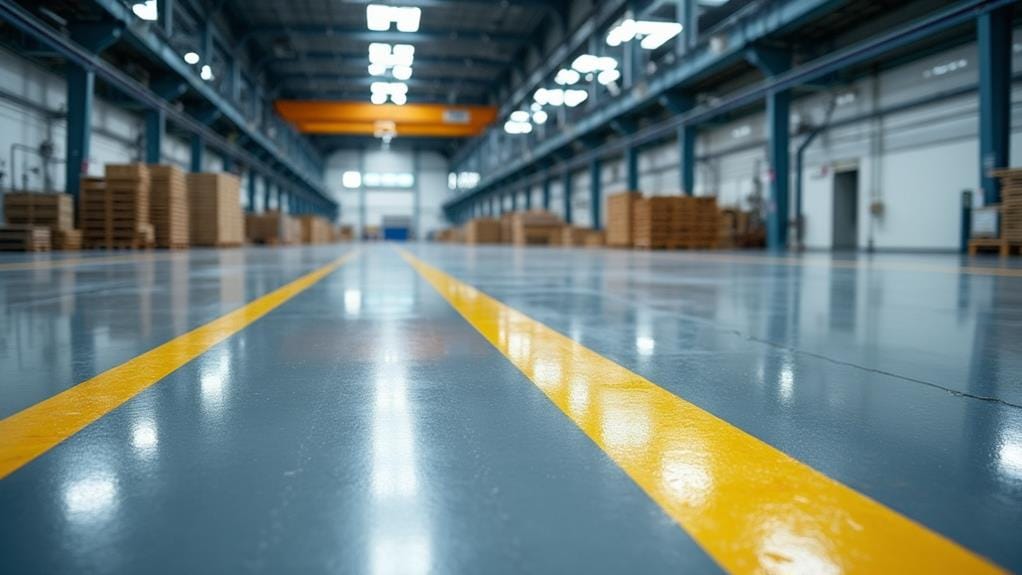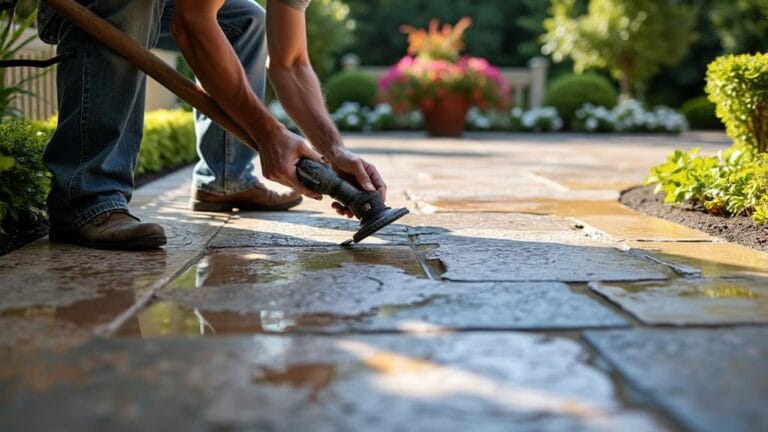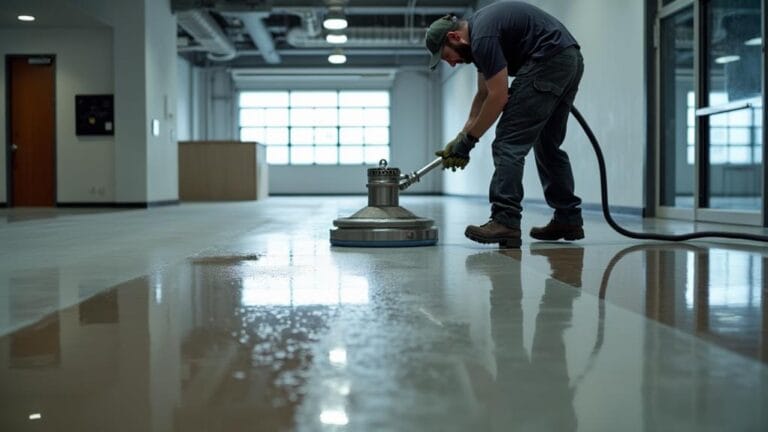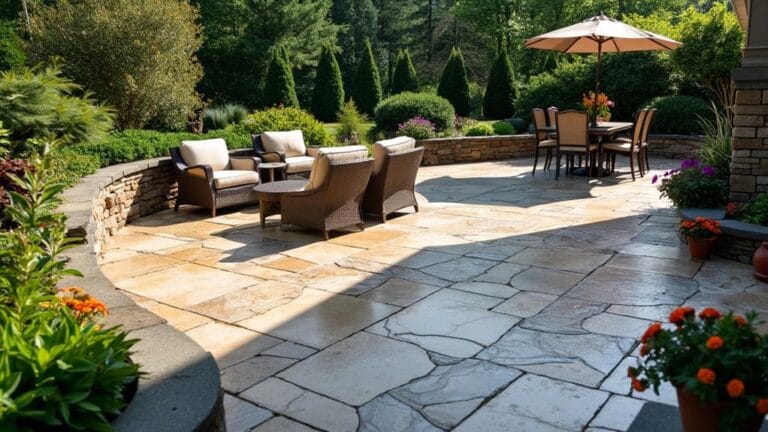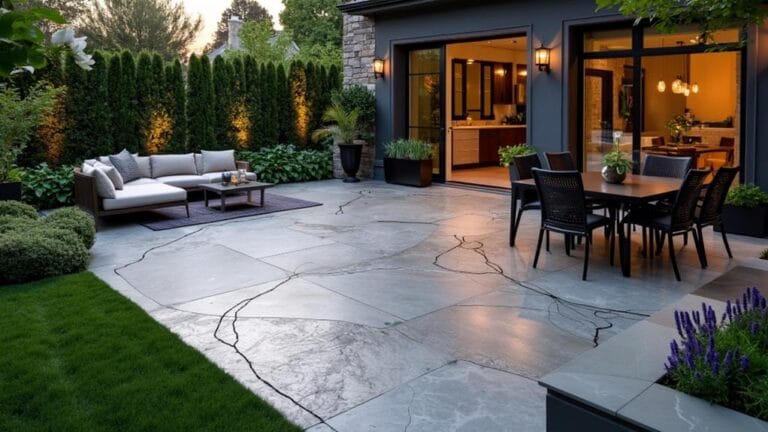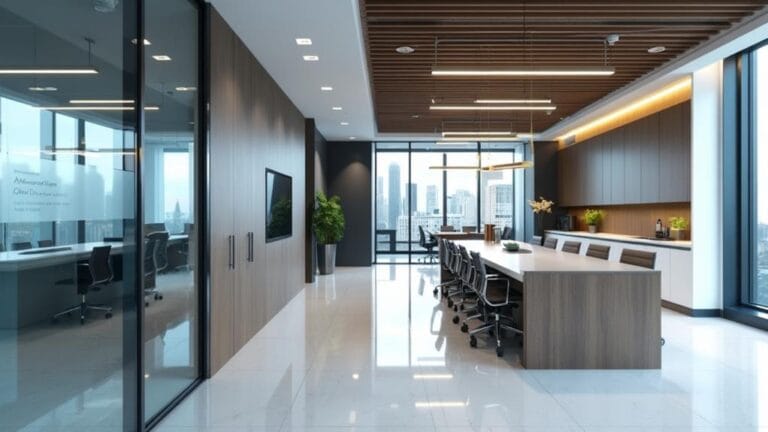3 Best Commercial Finishing Solutions for Industrial Floors
When we're choosing commercial finishing solutions for industrial floors, Epoxy Coatings, Polished Concrete, and Urethane Floor Systems stand out. Epoxy Coatings are incredibly durable, customizable, and create a seamless surface that's easy to clean. Polished Concrete is cost-effective, eco-friendly, and requires minimal maintenance. Urethane Floor Systems offer exceptional durability, quick curing times, and excellent UV stability, making them perfect for high-traffic areas. Each option has its unique benefits and applications. Let's investigate further to find which solution best fits your industrial flooring needs.
Epoxy Coatings
When it comes to epoxy coatings, they're among the most popular choices for industrial floors due to their durability and versatility. We can see why so many businesses opt for epoxy. The robust layer they form makes floors resistant to heavy traffic, chemicals, and wear and tear. But let's dig a bit deeper into the epoxy benefits that are making waves in various industries.
First, epoxy applications are all about adaptability. Whether we need to coat warehouse floors, manufacturing plants, or even commercial kitchens, epoxy stands up to the challenge. It seals the concrete, creating a seamless, non-porous surface that prevents contaminants from seeping in. This makes it not only highly sanitary but also easy to clean.
Furthermore, epoxy's aesthetic appeal shouldn't be underestimated. We have the option to customize the look with different colors and finishes, which can align well with our branding or safety guidelines. The high-gloss finish also improves lighting, enhancing visibility in work areas.
To sum it up, epoxy coatings provide unmatched durability and adaptability. Whether it's for heavy-duty industrial use or a sleek commercial environment, the benefits make it an excellent choice for various applications.
Polished Concrete
Polished concrete transforms industrial floors into sleek, high-performance surfaces. It's not just about aesthetics; polished concrete additionally offers durability and ease of maintenance. With its ability to withstand heavy foot traffic and resist stains, it's becoming a preferred choice in many commercial spaces. Before we explore the benefits, we can't overlook the importance of surface preparation. Properly preparing the concrete guarantees a smooth, long-lasting finish that's resistant to wear and tear.
When we think about why polished concrete might be the right choice, consider the following:
- Cost-Effective: Polishing concrete is often more affordable than installing other flooring options. It leverages existing concrete slabs, avoiding additional material costs, which makes it a cost-effective solution for many businesses.
- Low Maintenance: Routine sweeping and occasional damp mopping keep polished concrete looking pristine. For added longevity, consider these maintenance tips: use a neutral pH cleaner and avoid harsh chemicals.
- Eco-Friendly: With no need for additional materials and coatings, polished concrete is a sustainable choice, reducing our ecological footprint.
Polished concrete effortlessly balances functionality with aesthetic appeal. Remember, the key to success lies in meticulous surface preparation and sticking to simple maintenance tips. By doing so, we guarantee our floors remain both stunning and resilient for years to come.
Urethane Floor Systems
Urethane floor systems are an outstanding option for industrial settings that demand performance and durability. They provide a host of durability benefits, making them particularly suitable for environments facing heavy foot traffic, machinery movement, and chemical exposure. These systems offer exceptional resistance to abrasion, impacts, and staining, ensuring a long lifespan even in the harshest conditions.
When we look at the application techniques, urethane floors stand out for their versatility. They can be applied over various substrates, including concrete and wood, providing seamless and smooth surfaces. The process typically involves prepping the existing floor, applying a primer, adding the urethane coating, and finishing with a topcoat. This multi-layered approach maximizes adhesion and durability.
One of the major advantages of urethane systems is their quick curing time, minimizing downtime and ensuring that your industrial operations can resume swiftly. Furthermore, they boast excellent UV stability, preventing discoloration over time and maintaining a professional appearance.
Let's not forget the ease of maintenance. Urethane floors are straightforward to clean and keep in good condition, reducing the long-term maintenance costs. To sum up, urethane floor systems offer unmatched durability benefits and versatile application techniques, making them a top choice for industrial flooring solutions.
Frequently Asked Questions
What Is the Cost of Maintaining Different Industrial Flooring Options?
Picture maintaining a high-traffic warehouse floor. We've got to evaluate floor maintenance costs and flooring longevity factors. For instance, polished concrete may have a higher initial cost but it's durable and offers low maintenance. Conversely, vinyl might need frequent replacements because of wear and tear, raising long-term costs. So, when evaluating costs, we must weigh upfront expenses against how long each flooring type will last with regular upkeep.
How Do Finishing Solutions Affect the Floor's Resistance to Chemical Spills?
When we talk about how finishing solutions affect a floor's resistance to chemical spills, it's vital to take into account their role in enhancing chemical resistance. Quality finishes create a protective barrier, making spill cleanup easier and less damaging. We're fundamentally boosting the floor's resilience against corrosive substances, which in turn prolongs its lifespan and reduces maintenance costs. So, investing in the right finishing solution really pays off.
Are There Eco-Friendly Finishing Alternatives for Industrial Floors?
Yes, there are eco-friendly finishing alternatives for industrial floors. Let's imagine a warehouse using sustainable materials like bio-based polyurethanes. By switching to these, they earn green certifications, showcasing their environmental commitment. We can reduce our carbon footprint and still maintain durability. It's a win-win for our business and the planet. Considering sustainable materials helps us meet green certifications, all while ensuring our floors remain robust against wear and tear.
What Is the Installation Downtime for Various Commercial Floor Finishes?
When considering the installation process, we find that epoxy coatings typically require the longest downtime, around 72 hours. Polyurethane finishes are faster, usually curing within 24-48 hours, offering good flooring longevity. Polished concrete might be the quickest, often ready within a day, but it still provides durable results. Let's balance your need for quick installation with the long-term benefits each finish offers, ensuring minimal disruption and maximum durability.
How Do Different Floor Finishing Solutions Impact Indoor Air Quality?
Did you know that indoor air quality can be up to five times worse than outdoor air? Different floor finish types play a big role in this. For example, solvent-based finishes often release more indoor pollutants like VOCs, which can impact our health. On the other hand, water-based finishes emit fewer harmful chemicals, resulting in cleaner air. Choosing the right floor finish can make a huge difference in the air we breathe.

